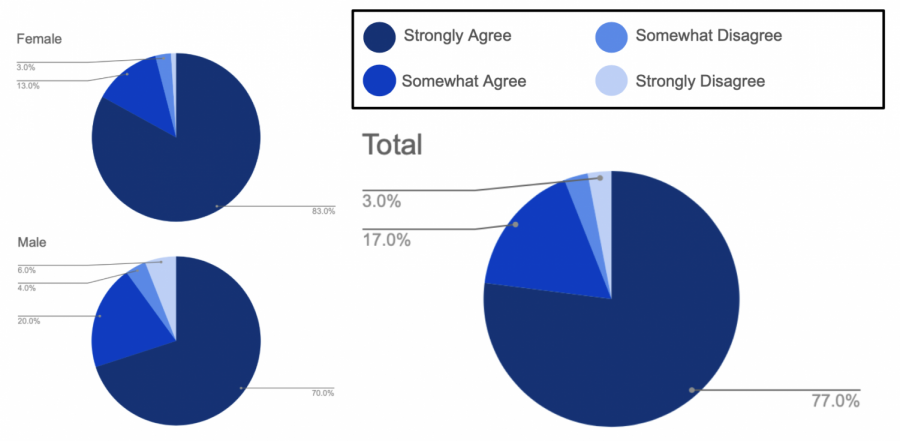Equal Rights Amendment ratification fundamental to democracy
Infographic by Sophie Casey '20
Men and women polled by the ERACoalition were asked to indicate the degree to which they agreed or disagreed with the statement: “I would support an amendment to the US Constitution that guarantees equal rights for both men and women.” The majority of those surveyed in both groups said they “strongly agree.” All information is courtesy of the ERA Coalition.
I first learned of the Equal Rights Amendment as a relic of history. In the room of my sophomore American history class, I committed to memory not only the sequence of presidents and a timeline of war, but also our country’s inability to ensure equality on the basis of sex.
The Equal Rights Amendment is remarkably uncomplicated, perhaps to signify the simplicity of its request. The text, composed in 1943, remains the same.
It is admittedly not an onerous demand; it asks to ensure all sexes be treated as equal members of society. Yet, in the 1980s, the Equal Rights Amendment was abandoned for lack of state support—only 35 had ratified it out of the necessary 38. Despite its original failure to pass, I hope to believe that there is not an expiration date on equality. The importance of enshrining full equality in our national, overarching law has not diminished over time—if anything, it is more necessary than ever as laws and court rulings that galvanized the move towards equality are in legislative peril. The Equal Rights Amendment must be passed to end legal distinction between the sexes.
Equality is a fundamental facet of our society and can only remain so if constitutionally secured.
Some purport that the moral crusade for sexual equality is already won. And indeed, women enjoy many rights and opportunities in our country. Women are found at all levels of government. In the 2018 midterms, a record number were elected to Congress. Three women serve on the Supreme Court. At the time of writing this article, four women are running for president. Legally, there are policies against sex discrimination that vary by state. Women are no longer prevented from high-ranking military positions. Abortion is recognized as a constitutional right. We are approaching the 100th anniversary of female suffrage. I do not deny that we have made significant progress over the last century.
But as history has consistently shown, nothing is certain; sociopolitical regression is a daunting prospect. Even after Roe v. Wade, abortion rights continue to be threatened, and by extension, the rights of women are also vulnerable. Progress should be lauded, but also preserved through legislation. Equality is a fundamental facet of our society and can only remain so if constitutionally secured. The Equal Rights Amendment will not only ensure equitability, but would also override inadequate individual laws and revocable precedent.
We cannot operate under the delusion that equality is a current tenet of our society when the aforementioned laws exist.
The Equal Rights Amendment would also shape future law. Legislation that is incompatible with the Amendment—that is, sexist—would be evaluated accordingly. Current laws with discriminatory stipulations would be overturned. In Cleveland, women are prohibited from showing cleavage. In Arizona, the law dictates that the governor, secretary of state, and treasurer must be male. In Georgia, the husband is legally declared the “head of the family,” and his wife is “subject to him.” Such laws are not enforced, but their continued existence despite expressed archaic values is deeply problematic. We cannot operate under the delusion that equality is a current tenet of our society when the aforementioned laws exist. They reflect a time when women were consciously ignored in our Constitution and suggest that equality is not a pertinent issue in our national dialogue.
Virginia is set to become the 38th state to approve the Equal Rights Amendment following a revitalized spur of initiative from Nevada and Illinois in 2017 and 2018 respectively. Despite support in state legislatures and 94% of Americans, the Equal Rights Amendment still faces ardent opposition. Alabama, Louisiana and South Dakota are suing to block ratification. In doing so, they have sone a disservice to women, the democratic operation and the will of the American people.
Sexual discrimination is not an obsolete concept; rather, it is an unsavory impression ingrained in our laws. The Equal Rights Amendment would not only secure the political triumphs women have accomplished, but propel the country into a new age of equality. Rights should not pertain to sex, but people. The 28th Amendment should not only be our history, but our future.





























































